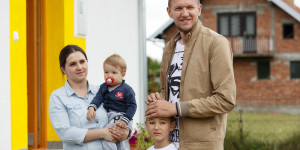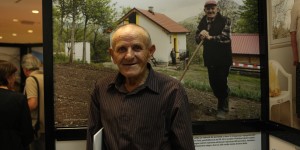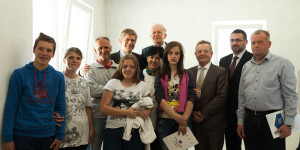Joint EU – UNHCR project “Support to durable solutions of Revised Annex VII DPA Implementation Strategy” has provided assistance for at least 2,400 families of returnees and displaced persons in the last three years, by means of an innovative methodology of teamwork to help the neediest.
A two-day meeting of the Extended Project Implementation Team of the Project “Support to durable solutions of Revised Annex VII DPA Implementation Strategy” took place in Sarajevo on 15 and 16 December 2016. The project, which aims to address the most severe of the remaining problems of the wartime displacement in Bosnia and Herzegovina, is coming to a close on 31 December 2016, and the meeting reviewed the results achieved during its implementation, but also discussed how to replicate in further work on Annex VII the effective and innovative procedures and approaches applied in this project.
This project was launched in 2014 in Brčko District BiH, Bijeljina, Bosanski Petrovac, Derventa, Foča Gradiška, Maglaj, Mostar, Prijedor and Živinice, assisting at least 2,400 vulnerable displaced persons and returnees in BiH in finding solutions to their remaining problems of displacement.
The meeting of the Extended Project Implementation Team, co-chaired by the Ministry for Human Rights and Refugees of Bosnia and Herzegovina and the UNHCR Representation in Bosnia and Herzegovina, gathered participants from the Delegation of the European Union to Bosnia and Herzegovina, Brčko District BiH and nine participating cities/municipalities, the Entity displacement ministries as well as the seven implementing partner organizations – United Nations Development Programme, United Nations Children’s Fund, the International Organization for Migration, Hilfswerk Austria International, Bosnian Humanitarian Logistics Service, Foundation for Local Democracy and the association “Vaša prava BiH”.
Over the three year period, 762 grants were awarded for self-employment and income generation; 242 producers received financial incentives, training and technical support connecting them with marketing companies by means of “value chains”; 10 small and medium-sized enterprises received financial assistance to create new jobs; free legal aid was provided to more than 10,000 people and their families; basic social protection and inclusion services for about 600 children from vulnerable families were ensured; home health care was made available for 276 elderly people, and related mechanisms and capacities of local communities were strengthened, while 179 housing units with basic infrastructure were built and rehabilitated.
Addressing the closing session of the two-day meeting, the Minister for Human Rights and Refugees of BiH and co-chair of the Project’s Steering Board, Ms. Semiha Borovac said: “It is important to point out that this project began to change the awareness and listen closely to the real needs of the displaced persons. An entirely new approach to solving these problems was introduced in a way that the (re)construction of returnee homes was accompanied by measures of economic sustainability, which is the key for the overall sustainability of returns. Because, for the return to be sustainable it is not enough just to secure shelter, but also living conditions worthy of human beings in the 21st century, which is a much more demanding and complex part of the job. This project has proven that all this is very much feasible.”
The three-year project is financed by the European Union with 7 million euros from IPA funds. In his address at the closing session of the meeting of the Extended Project Implementation Team, Mr. Massimo Mina, Head of Operations for Social Development, Civil Society and Cross Border Cooperation of the EU Delegation and member of the Project’s Steering Board, emphasized: “The achievement of the objectives of the Revised Annex VII Strategy and of the Regional Housing Programme entails a large concerted effort between several institutional stakeholders at different levels of government which is critical in ensuring efficient implementation and sustainability of the operation in the long-term. Targeted Municipalities should ensure adequate socio-economic conditions in order to facilitate local integration and sustainable return of the most vulnerable beneficiaries. We strongly encourage co-ordinated efforts of the responsible ministries, cantons and the local government units in the design and implementation of the required socio-economic measures that would support the return process, beyond the pure housing solution.”
UNHCR is co-funding the Project with 1.1 million euros. The UN Refugee Agency is also the lead agency in its implementation. In his closing remarks to the event, Mr. Andrew Mayne, UNHCR Regional Representative for South Eastern Europe and co-chair of the Project’s Steering Board, concluded: “This project introduced a new methodology for implementation of the DPA Annex VII Revised Strategy, consisting of needs-based multi-sectoral teamwork between local authorities and communities, civil society, project partners and beneficiaries themselves, and allowing far more vulnerable displaced families to be reached than originally planned. The challenge now is for BiH authorities at all levels to continue to apply this innovative approach to bring solutions to those displaced and returnee families who remain most in need.”



